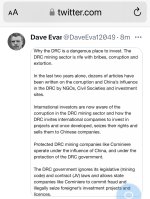You are using an out of date browser. It may not display this or other websites correctly.
You should upgrade or use an alternative browser.
You should upgrade or use an alternative browser.
Felix Antoine Tshisekedi Tshilombo
- Thread starter MoneyBags1348
- Start date
Frank
Top 20
Félix Tshisekedi presented the 6 objectives of his second term
President Félix Tshisekedi, in his inauguration speech delivered this Saturday, January 20, on the occasion of his swearing in as president-elect, presented the six objectives of his second 5-year term.
To this end, the Head of State promised to create more jobs, by accelerating the promotion of youth entrepreneurship; to protect the purchasing power of households by stabilizing the exchange rate; to ensure the security of the populations, the national territory, the goods and interests of the country, by restructuring the security and defense apparatus; to continue the diversification of the economy and strengthen its competitiveness; to guarantee greater access to basic social services; as well as effectively strengthening public services.
In addition, Félix Tshisekedi affirmed that in addition to these objectives are three major challenges which will be the priorities of his second term.
This concerns the opening up of the national territory; development of the agricultural value chain and urban sanitation.
mediacongo

* With No mention of dealing with Corruption

President Félix Tshisekedi, in his inauguration speech delivered this Saturday, January 20, on the occasion of his swearing in as president-elect, presented the six objectives of his second 5-year term.
To this end, the Head of State promised to create more jobs, by accelerating the promotion of youth entrepreneurship; to protect the purchasing power of households by stabilizing the exchange rate; to ensure the security of the populations, the national territory, the goods and interests of the country, by restructuring the security and defense apparatus; to continue the diversification of the economy and strengthen its competitiveness; to guarantee greater access to basic social services; as well as effectively strengthening public services.
In addition, Félix Tshisekedi affirmed that in addition to these objectives are three major challenges which will be the priorities of his second term.
This concerns the opening up of the national territory; development of the agricultural value chain and urban sanitation.
mediacongo
* With No mention of dealing with Corruption
Last edited:
Frank
Top 20
Congo and China talking $7 billion in finance, Tshisekedi says
China and the Democratic Republic of Congo are discussing $7 billion in financing as part of a renegotiated minerals-for-infrastructure deal, President Felix Tshisekedi said Saturday at his second inaugural address in the capital, Kinshasa.

Tshisekedi has been pushing for a restructuring of a 2008 $6.2 billion contract between the countries, which he says has provided little benefit to Congo.
The original deal promised $3 billion in infrastructure projects paid for by proceeds from a copper and cobalt mine known as Sicomines.
While the mine has operated for years, less than a third of the development money was ever disbursed, according to Congo’s government.
Tshisekedi said a new infrastructure initiative to open up the enormous country would be financed “thanks to the upcoming allocation of funds from the envelope obtained as part of the renegotiation of the Sicomines project and which should reach a total amount of $7 billion.”
He did not offer further details.
Congo is Africa’s second biggest country by landmass and is deeply poor despite huge mineral riches, including key green-energy metals like copper and cobalt.
China, where most of those minerals are processed, is by far the country’s largest trading partner.
China’s embassy in Congo did not immediately respond to two emails requesting comment Saturday outside normal business hours.
Tshisekedi was sworn in for a second five-year term before tens of thousands of supporters and more than a dozen African heads of state at Congo’s national stadium.
The president won more than 70% of ballots in the country’s Dec. 20 election, which was marred by delays that stretched the voting for days.
Opposition leaders have rejected the poll and called for protests on Saturday, but the international community has in large part accepted the results given Tshisekedi’s margin of victory and the generally peaceful elections.
In his speech, Tshisekedi also vowed to reduce inflation, stabilize the exchange rate and expand industry to create employment in the country.
More than 62% of Congo’s nearly 100 million people live in poverty, according to the World Bank.
www.mining.com/web/congo-and-china-talking-7-billion-in-finance-tshisekedi-says/
Last edited:
Dave Evans
Regular
22/01/2024
Haut-Katanga: Governor Jacques Kyabula elected provincial deputy in the electoral district of Lubumbashi
Haut-Katanga: Governor Jacques Kyabula elected provincial deputy in the electoral district of Lubumbashi
Frank
Top 20
100 days, RAM…, among the failures of Tshisekedi’s first term
Félix Tshisekedi recognized the errors of his first mandate and promised to correct them during the second five-year term which he began on Saturday January 20, 2024.
In his inauguration speech at the Martyrs stadium in Kinshasa, the head of state pledged to quickly carry out development actions.
Aware of relevant criticism during his first five-year term, Tshisekedi intends to push through significant reforms aimed at putting an end to impunity and thus indiscriminately sanctioning all perpetrators of reprehensible acts.
“I am committed to using everything in my power to ensure that the mistakes of the past are no longer repeated and that the actions necessary for the advancement of our country are promptly taken,” he declared.
Controversies surrounding the flagship “100 days” project and the introduction of the tax on the Mobile Devices Register (RAM) had highlighted the overtones of fraud, embezzlement and impunity.
Analysis of the errors of the 1st Tshisekedi mandate
The “100 Days” project, for example, was surrounded by allegations of embezzlement linked to irregularities in the awarding of contracts and the allocation of funds and yet, it was initially designed to accelerate development and quickly respond to the needs of the population.
“Critics point out that this key initiative has been diverted from its initial objective, thus undermining public confidence in the ability of the President of the Republic to deliver tangible results,” independent analysts explain to Ouragan.
Similarly, the introduction of the tax on RAM had also raised concerns about its implementation and especially the use of the revenue generated.
Reports of embezzlement linked to this tax have fueled debate.
The problem had even called into question the transparency and accountability of the national executive.
But all the people arrested had been released.
Analysts also highlight the persistent impunity of members of the government and heads of public companies.
“This had cast a shadow over President Tshisekedi’s record during his first term.
These gaps have fueled the perception that some people enjoy untouchable status.
A policy that undermines equality before the law that must be banned at all costs,” they insisted.
Although contested by the opposition, President Tshisekedi's second term promises to be a crucial period for him to demonstrate to the Congolese his renewed commitment to respecting democratic principles.
At the end of his oath, the Head of State received the symbols of power from the President of the Constitutional Court.
He has officially just taken office for his last term.
mediacongo

Félix Tshisekedi recognized the errors of his first mandate and promised to correct them during the second five-year term which he began on Saturday January 20, 2024.
In his inauguration speech at the Martyrs stadium in Kinshasa, the head of state pledged to quickly carry out development actions.
Aware of relevant criticism during his first five-year term, Tshisekedi intends to push through significant reforms aimed at putting an end to impunity and thus indiscriminately sanctioning all perpetrators of reprehensible acts.
“I am committed to using everything in my power to ensure that the mistakes of the past are no longer repeated and that the actions necessary for the advancement of our country are promptly taken,” he declared.
Controversies surrounding the flagship “100 days” project and the introduction of the tax on the Mobile Devices Register (RAM) had highlighted the overtones of fraud, embezzlement and impunity.
Analysis of the errors of the 1st Tshisekedi mandate
The “100 Days” project, for example, was surrounded by allegations of embezzlement linked to irregularities in the awarding of contracts and the allocation of funds and yet, it was initially designed to accelerate development and quickly respond to the needs of the population.
“Critics point out that this key initiative has been diverted from its initial objective, thus undermining public confidence in the ability of the President of the Republic to deliver tangible results,” independent analysts explain to Ouragan.
Similarly, the introduction of the tax on RAM had also raised concerns about its implementation and especially the use of the revenue generated.
Reports of embezzlement linked to this tax have fueled debate.
The problem had even called into question the transparency and accountability of the national executive.
But all the people arrested had been released.
Analysts also highlight the persistent impunity of members of the government and heads of public companies.
“This had cast a shadow over President Tshisekedi’s record during his first term.
These gaps have fueled the perception that some people enjoy untouchable status.
A policy that undermines equality before the law that must be banned at all costs,” they insisted.
Although contested by the opposition, President Tshisekedi's second term promises to be a crucial period for him to demonstrate to the Congolese his renewed commitment to respecting democratic principles.
At the end of his oath, the Head of State received the symbols of power from the President of the Constitutional Court.
He has officially just taken office for his last term.
mediacongo
Dave Evans
Regular
23/01/2024
With these statistics, @VitalKamerhe1
becomes essential and unconditional management partner of Félix Tshisekedi. Nothing can be done without him. What markings on the pants!
With these statistics, @VitalKamerhe1
becomes essential and unconditional management partner of Félix Tshisekedi. Nothing can be done without him. What markings on the pants!
Dave Evans
Regular
23/01/2024
Translated from French by
Exclusive: La Dynamique AA/UNC, AVK 2028, AB50, AMSC, AAAP, CODE AND CDER in progress. More than 150 National and Provincial elected officials.
Translated from French by
Exclusive: La Dynamique AA/UNC, AVK 2028, AB50, AMSC, AAAP, CODE AND CDER in progress. More than 150 National and Provincial elected officials.
Dave Evans
Regular
23/01/2024
Translated from French by
#RDC PROVINCIAL ELECTIONS | KINSHASA: 1. UDPS 14 deputies 2. ACP-A 9 deputies 3. MLC 7 deputies 4. AFDC-A 5 deputies 5. 4AC 6 deputies 6. ANB 2 deputies 7. AACPG 1 deputy In total 44 deputies + the 4 traditional chiefs who will be co-opted to make 48 deputies. No opponent elected in a city known to be close to the opposition. A first.
Translated from French by
#RDC PROVINCIAL ELECTIONS | KINSHASA: 1. UDPS 14 deputies 2. ACP-A 9 deputies 3. MLC 7 deputies 4. AFDC-A 5 deputies 5. 4AC 6 deputies 6. ANB 2 deputies 7. AACPG 1 deputy In total 44 deputies + the 4 traditional chiefs who will be co-opted to make 48 deputies. No opponent elected in a city known to be close to the opposition. A first.
Frank
Top 20
Sicomines: the IGF snatches US$7 billion from the Chinese
The renegotiation of the Sicomines joint venture resulted in an addition of $7 billion over ten years for the benefit of the DRC.
President Félix Tshisekedi declared this in his inauguration speech on January 20, 2024 at the Martyrs of Pentecost stadium.
The chief inspector of the IGF, Jules Alingete Key, held firm to an amendment of 17 billion dollars for a better rebalancing between the DRC and the Chinese Enterprise Group.
But the head of state had diplomatically tempered in the name of the eternal friendship between the DRC and China.
But in front of the world, Tshisekedi naturally demonstrated, urbi et orbi, all his gratitude to the General Inspectorate of Finance which had detected the imbalance to the disadvantage of the DRC in the adjoining Sicomines project.
Tshisekedi announced a first disbursement of $300 million from January 2024 and $400 million in April 2024... for the benefit of opening up territories in the hinterland.
The IGF therefore offered financial support which will give visibility to the Local Development Program (PDL) of 145 territories.
Each year, the DRC will benefit from these disbursements financed by the Sicomines project.
Started in June 2023, the negotiations on the revisitation of the famous barter have been marked by verbal blows and extreme positions.
But the storm eventually calmed down.
On July 10, 2023, the temperate Jules Alingete moved up a notch on the scale of ire, disconcerted by the haughty attitude of the delegates from Chinese companies, Crec, Sinohydro and Exim Bank.
That day, leaving the Palais de la Nation – the equivalent of the White House in the DRC – the head of the IGF department took offense at what he described as yellow neo-colonialism to which , according to him, the Congolese will not be able to submit.
At the end of February 2023, the report from the General Inspectorate of Finance denounced the unbalanced nature of this Chinese contract concluded during the time of Joseph Kabila, 16 years ago.
Not only did Sicomines, the joint venture created by the Chinese Enterprise Group (GEC) and Gécamines, hardly bring in “a few billion dollars” as the first minister, Matata Ponyo, boasted in May 2012 in front of the National Assembly, but above all a number of infrastructures, for which the Chinese side was entitled to draw cobalt and copper from the Katangese cooperbelt, and no doubt other undeclared related minerals, have not experienced the beginning of start of investments in infrastructure.
These include 3,000 km of railways, 31 hospitals with 150 beds and 145 health centers in each of 145 territories of the DRC.
The initial value of all the projects agreed in this barter was 6.5 before being reduced by more than half, to 3 billion dollars, following pressure from the IMF, and behind the scenes, from Western countries.
However, Jules Alingete deplores the fact that the DRC has brought into the mixed economy mining society, in addition to deposits valued at more than 50 billion dollars, a tax exemption regime which has hardly had the expected effects.
While Chinese companies have already made more than $10 billion in profits as part of this partnership, the DRC had until then only been satisfied with the small fry, infrastructure valued at $822 million, the rest overcharged , faith of the IGF.
For Jules Alingete's service, considering the contributions of each party in Sicomines, it is crystal clear that the DRC has been cheated, because its shares are established at 32% compared to 68 for the GEC.
Thus, Jules Alingete and his IGF mobilized the strategic committee engaged in negotiations with the Chinese not to waver as the DRC's demands are all well-founded.
The strategic committee includes in particular the ministers of Infrastructure, Budget, Finance, Mines, Gécamines, the Steering Agency for coordination and monitoring of the collaboration agreement signed between the DRC and private partners (APCSC), the secretariat executive of the Extractive Industries Transparency Initiative (EITI) and naturally of the IGF.
Jules Alingete held firm and succeeded in obtaining substantial financial compensation for the grievances raised in the Chinese contract. And these damages must be accompanied, firstly, by a change in the distribution of capital and profits in Sicomines.
Second, the mining joint venture must be based on a new balanced distribution of responsibilities as well as an increase in the amount of Chinese investments in infrastructure, at least double, or from $3 to $7 billion in the short term.
Third, respecting deadlines in the construction and delivery of agreed infrastructure.
Let's wait and see.
www.mediacongo.net/article-actualite-132138_sicomines_l_igf_arrache_7_milliards_us_aux_chinois.html
The renegotiation of the Sicomines joint venture resulted in an addition of $7 billion over ten years for the benefit of the DRC.
President Félix Tshisekedi declared this in his inauguration speech on January 20, 2024 at the Martyrs of Pentecost stadium.
The chief inspector of the IGF, Jules Alingete Key, held firm to an amendment of 17 billion dollars for a better rebalancing between the DRC and the Chinese Enterprise Group.
But the head of state had diplomatically tempered in the name of the eternal friendship between the DRC and China.
But in front of the world, Tshisekedi naturally demonstrated, urbi et orbi, all his gratitude to the General Inspectorate of Finance which had detected the imbalance to the disadvantage of the DRC in the adjoining Sicomines project.
Tshisekedi announced a first disbursement of $300 million from January 2024 and $400 million in April 2024... for the benefit of opening up territories in the hinterland.
The IGF therefore offered financial support which will give visibility to the Local Development Program (PDL) of 145 territories.
Each year, the DRC will benefit from these disbursements financed by the Sicomines project.
Started in June 2023, the negotiations on the revisitation of the famous barter have been marked by verbal blows and extreme positions.
But the storm eventually calmed down.
On July 10, 2023, the temperate Jules Alingete moved up a notch on the scale of ire, disconcerted by the haughty attitude of the delegates from Chinese companies, Crec, Sinohydro and Exim Bank.
That day, leaving the Palais de la Nation – the equivalent of the White House in the DRC – the head of the IGF department took offense at what he described as yellow neo-colonialism to which , according to him, the Congolese will not be able to submit.
At the end of February 2023, the report from the General Inspectorate of Finance denounced the unbalanced nature of this Chinese contract concluded during the time of Joseph Kabila, 16 years ago.
Not only did Sicomines, the joint venture created by the Chinese Enterprise Group (GEC) and Gécamines, hardly bring in “a few billion dollars” as the first minister, Matata Ponyo, boasted in May 2012 in front of the National Assembly, but above all a number of infrastructures, for which the Chinese side was entitled to draw cobalt and copper from the Katangese cooperbelt, and no doubt other undeclared related minerals, have not experienced the beginning of start of investments in infrastructure.
These include 3,000 km of railways, 31 hospitals with 150 beds and 145 health centers in each of 145 territories of the DRC.
The initial value of all the projects agreed in this barter was 6.5 before being reduced by more than half, to 3 billion dollars, following pressure from the IMF, and behind the scenes, from Western countries.
However, Jules Alingete deplores the fact that the DRC has brought into the mixed economy mining society, in addition to deposits valued at more than 50 billion dollars, a tax exemption regime which has hardly had the expected effects.
While Chinese companies have already made more than $10 billion in profits as part of this partnership, the DRC had until then only been satisfied with the small fry, infrastructure valued at $822 million, the rest overcharged , faith of the IGF.
For Jules Alingete's service, considering the contributions of each party in Sicomines, it is crystal clear that the DRC has been cheated, because its shares are established at 32% compared to 68 for the GEC.
Thus, Jules Alingete and his IGF mobilized the strategic committee engaged in negotiations with the Chinese not to waver as the DRC's demands are all well-founded.
The strategic committee includes in particular the ministers of Infrastructure, Budget, Finance, Mines, Gécamines, the Steering Agency for coordination and monitoring of the collaboration agreement signed between the DRC and private partners (APCSC), the secretariat executive of the Extractive Industries Transparency Initiative (EITI) and naturally of the IGF.
Jules Alingete held firm and succeeded in obtaining substantial financial compensation for the grievances raised in the Chinese contract. And these damages must be accompanied, firstly, by a change in the distribution of capital and profits in Sicomines.
Second, the mining joint venture must be based on a new balanced distribution of responsibilities as well as an increase in the amount of Chinese investments in infrastructure, at least double, or from $3 to $7 billion in the short term.
Third, respecting deadlines in the construction and delivery of agreed infrastructure.
Let's wait and see.
www.mediacongo.net/article-actualite-132138_sicomines_l_igf_arrache_7_milliards_us_aux_chinois.html
Dave Evans
Regular
22/09/2023
Tony and Ilna Kanku are Tshisekedi’s cousins….
They have their hands on mining areas in Katanga
They are behind Primera Gold and Metal
Tony Kanku Shiku is Tshisekedi’s special adviser and Tshisekedi trusts him
18/09/2023
Translated from French by
#TonyKANKU cousin of the Head of State at the heart of mafia financial networks. 1. Oil in Katanga: its opaque relations with Kenyan investors are destabilizing the country's economy, 2. The Primera folder, total opacity 3. Huawei vs GTCC (Instrumentalized justice)
Christian Lukusa
@Christi17287565
Il est dans le viseur des Usa depuis 2021... Un mafieux...
Translated from French by
He has been in the sights of the USA since 2021... A mafioso...
6:33 PM · Sep 18, 2023
18/09/2023
Victor Tesongo :#RDC J-86Fin mandat du Prédateur
@TesongoVictor
Un mafieux soutenu par Tony Kanku le cousin du Chef de l’Etat.
Translated from French by
A mafioso supported by Tony Kanku, the cousin of the Head of State.
Tony Kanku Shiku


Tony Kanku Shiku
Administrateur Directeur General chez Shiku Trade Company sprl
Shiku Trade Company sprlIchec Brussels Management School
Brussels Region, Belgium
160 followers 151 connections

Présent au Kongo Business Network de…
Liked by Tony Kanku Shiku
Experience
Administrator Directeur General
Shiku Trade Company sprl
Directeur général
Hope Finance RDC
Jan 2008 - Dec 2010
3 years
Kinshasa RDC
Gérant de Leditac Color
Groupe LEDYA
Jan 2006 - May 2007
1 year 5 months
Kinshasa RDC
Education
Ichec Brussels Management School
Économie
2005 - 2009

Toujours, à la fin, je ferai.
Liked by Tony Kanku Shiku
People also viewed
Kayisu Shiku
Spécialiste médecine d’urgence
Hornu
ConnectNyembo Mbwizya Guylain
Directeur de cabinet du chef de l’État en Rdcongo.
Kinshasa
ConnectNicolas Kazadi
Senior Economist, Chief, Strategic & Policy Unit at UNDP
Togo
ConnectAlfred Dibandi
Avocat chez Barreau de Kinshasa - Matete
Kinshasa
ConnectYannick TSHIKAYA
Legal & Tax Advisor at SUTTER & PEARCE
Democratic Republic of the Congo
ConnectPatrick M. Luabeya
Political Scientist
Brussels Metropolitan Area
ConnectOlivier Nkidiaka, MBA, MSc.
Doctorate (Student) of Business Administration, Non-Profit Leadership and Management
Raleigh, NC
ConnectEric Mandala
Éric Mandala Kinzenga, est un homme d’affaires, Manager de plusieurs entreprises basées En RDC
Democratic Republic of the Congo
ConnectAlexi Mutanda
--
Belgium
ConnectDelly DINGIELO
--
Democratic Republic of the Congo
ConnectKanku Kalala
President at Generation Kalala Shambuyi, inc
Hyattsville, MD
ConnectJacques van Loo
--
Netherlands
ConnectGaetan KANKU
Ingénieur technicien en Géo-Mines
Democratic Republic of the Congo
ConnectPatrick ELENGA
Entrepreneur LORD INDUSTRY : spécialiste en vin de CHAMPAGNE
Crouttes-sur-Marne
ConnectZackee Mukendi Sambayi
Directeur des comptabilités/ Director of Accounting and Consolidation chez LEDYA GROUP
Democratic Republic of the Congo
ConnectSesomo Services
HR Manager at SESOMO SERVICES
Brussels Metropolitan Area
ConnectMichel Manzila Mboma
AVOCAT
Democratic Republic of the Congo
ConnectEvans Mugi
Managing Director (Kenya) at BCCM Advisors
Kenya
ConnectThibaut Hollanders
Partner at Liedekerke Wolters Waelbroeck Kirkpatrick
Brussels Metropolitan Area
ConnectJulie Lejeune
Director at NANSEN asbl/vzw
Brussels
Connect
View Tony’s full profile
Join to view full profile
- See who you know in common
- Get introduced
- Contact Tony directly
LinkedIn© 2023
23/01/2024
Translated from French by
Exclusive: La Dynamique AA/UNC, AVK 2028, AB50, AMSC, AAAP, CODE AND CDER in progress. More than 150 National and Provincial elected officials.
It’s no coincidence that Tony Kanku is involved in everything surrounding Felix Tshisekedi. He is FT’s second cousin and special adviser. He is also suspected of being part of a mining and investing mafia group in Katanga and thought to be protecting Celestin Kibeya Kabemba
Dave Evans
Regular
25/01/2024
Question: Are Julien Paluku, Vital Kamerhe and Tony Kanku part of the Katanga Mining & Investment Mafia?
Vital Kamerhe is Marius Mushagalusa Mihigo’s uncle and Tony Kanku is Felix Tshisekedi’s cousin
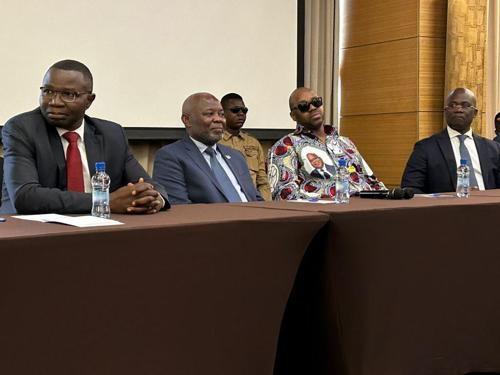
From left to right, Julien Paluku, Vital Kamerhe, Kanku Shiku and Jean-Lucien Busa, four political leaders who created the PCR political platform. Kinshasa, January 23, 2024.
Radio Okapi/Billy Yvan Lutumba
The political groups Actions des allies and UNC, Alliance des acteurs attachés au peuple (AAAP), Alliance bloc 50 (A/B50) and the Coalition des démocrates (CODE) respectively of Vital Kamerhe, Tony Kanku Shiku, Julien Paluku and Jean Lucien Busa announced on Tuesday, January 23, the creation of a new political platform called "Pact for a Rediscovered Congo" (PCR).
This new political grouping, a member of the Sacred Union for the Nation, was presented in Kinshasa, in front of the media and supporters of various parties constituting it.
According to its leaders, Pact for a Found Congo proposes in particular to strengthen cohesion within Félix Tshisekedi's political family in order to materialize his ideas for the well-being of the Congolese population.
This political platform also intends to strengthen the parliamentary majority during the legislature that starts.
Question:
-What reading do you make of the creation of this new platform within the Sacred Union of the Nation?
Guests:
-Julien Paluku, Minister of Industry. He is one of the initiators of the Pact for a Found Congo (PCR) platform.
- Jean Claude Tshilumbayi, national deputy and executive of the UDPS, party member of the Sacred Union. He is the initiator and manager of the 2A/TDC political grouping, affiliated with the UDPS.
-Christian Moleka, analyst and coordinator of the Dynamics of political scientists of the DRC.
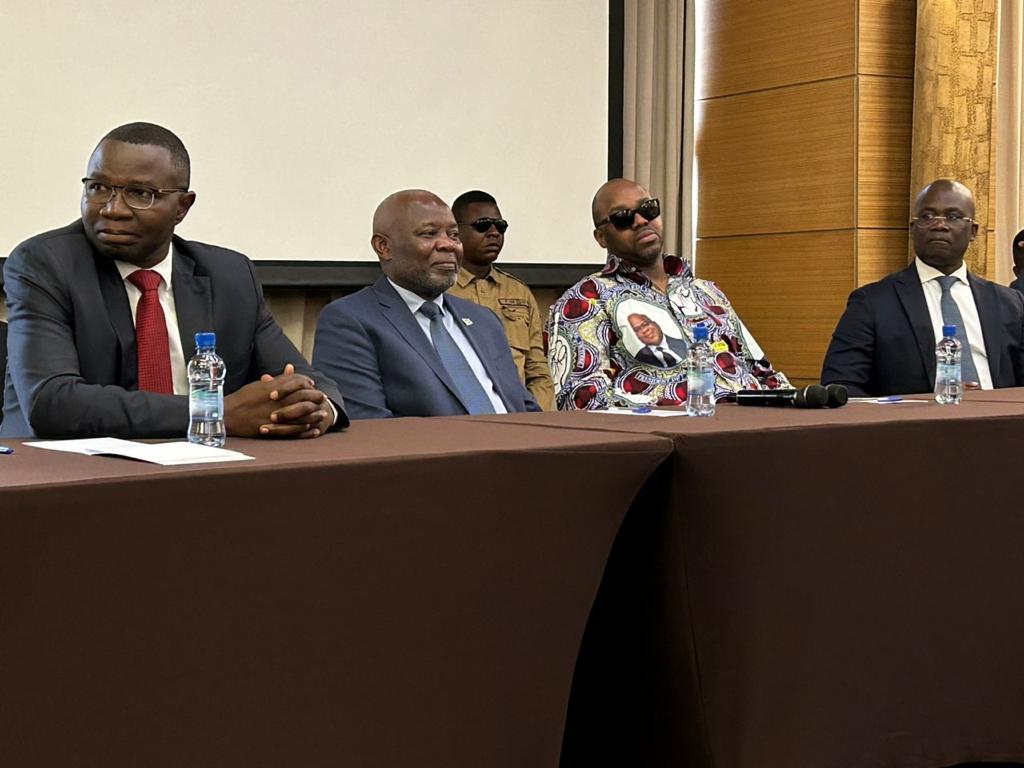
 www.radiookapi.net
www.radiookapi.net
Question: Are Julien Paluku, Vital Kamerhe and Tony Kanku part of the Katanga Mining & Investment Mafia?
Vital Kamerhe is Marius Mushagalusa Mihigo’s uncle and Tony Kanku is Felix Tshisekedi’s cousin
DRC: creation of the political platform called "Pact for a Regained Congo"
Published on Wed, 24/01/2024
From left to right, Julien Paluku, Vital Kamerhe, Kanku Shiku and Jean-Lucien Busa, four political leaders who created the PCR political platform. Kinshasa, January 23, 2024.
Radio Okapi/Billy Yvan Lutumba
The political groups Actions des allies and UNC, Alliance des acteurs attachés au peuple (AAAP), Alliance bloc 50 (A/B50) and the Coalition des démocrates (CODE) respectively of Vital Kamerhe, Tony Kanku Shiku, Julien Paluku and Jean Lucien Busa announced on Tuesday, January 23, the creation of a new political platform called "Pact for a Rediscovered Congo" (PCR).
This new political grouping, a member of the Sacred Union for the Nation, was presented in Kinshasa, in front of the media and supporters of various parties constituting it.
According to its leaders, Pact for a Found Congo proposes in particular to strengthen cohesion within Félix Tshisekedi's political family in order to materialize his ideas for the well-being of the Congolese population.
This political platform also intends to strengthen the parliamentary majority during the legislature that starts.
Question:
-What reading do you make of the creation of this new platform within the Sacred Union of the Nation?
Guests:
-Julien Paluku, Minister of Industry. He is one of the initiators of the Pact for a Found Congo (PCR) platform.
- Jean Claude Tshilumbayi, national deputy and executive of the UDPS, party member of the Sacred Union. He is the initiator and manager of the 2A/TDC political grouping, affiliated with the UDPS.
-Christian Moleka, analyst and coordinator of the Dynamics of political scientists of the DRC.

RDC : création de la plateforme politique dénommée « Pacte pour un Congo Retrouvé »
L'actualité politique de ce soir
Last edited:
Dave Evans
Regular
26/01/2024
Translated from French
Following the launch of the platform “For a Congo Found” (PCR) by Kamerhe, Paluku, Kanku, Bussa and Batumona,
a new platform entitled “Dynamique Agissons et Bâtissons” (DAB), led by the Prime Minister Sama, will emerge soon.
With its 72 national deputies and around a hundred provincial deputies, the DAB includes personalities such as Guy Loando (AREP), Muhindo Zangi (AVRP), Fifi Masuka (A24, A25, AN), Mayobo (Palu), Dany Banza ( ACO), Jean Claude Kabongo (former PR05 advisor), Tibasima, Bialosuka and Modeste Mutinga among his leading figures.
Translated from French
Following the launch of the platform “For a Congo Found” (PCR) by Kamerhe, Paluku, Kanku, Bussa and Batumona,
a new platform entitled “Dynamique Agissons et Bâtissons” (DAB), led by the Prime Minister Sama, will emerge soon.
With its 72 national deputies and around a hundred provincial deputies, the DAB includes personalities such as Guy Loando (AREP), Muhindo Zangi (AVRP), Fifi Masuka (A24, A25, AN), Mayobo (Palu), Dany Banza ( ACO), Jean Claude Kabongo (former PR05 advisor), Tibasima, Bialosuka and Modeste Mutinga among his leading figures.
Last edited:
Dave Evans
Regular
On one side we have Kamerhe, Paluku and Kanku
On the other side we have Lukonde and Loando
Winenut
GO AVZ!!!!
The work you do and the info you provide is amazing Dave
On one side we have Kamerhe, Paluku and Kanku
On the other side we have Lukonde and Loando
Thank you
Frank
Top 20
39 of the 59 members of the Government take part in their last council of ministers

A total of 39 members of the Government elected in the last legislative elections are taking part, this Friday, January 26, in their last council of ministers.
In principle, from January 29, 39 of the 59 members of this Government, including Prime Minister Sama Lukonde, should sit in Parliament to validate their mandate as national deputies.
Regarding the three ministers whose ballots were canceled by the Independent National Electoral Commission (CENI) for “fraud, violence and ballot stuffing”, did not take part in today's council of ministers, we learn. -we have official sources.
This last council of ministers with the configuration of all members of the government of the DRC was held under the leadership of the President of the Republic, Félix Tshisekedi, according to the presidency.

A total of 39 members of the Government elected in the last legislative elections are taking part, this Friday, January 26, in their last council of ministers.
In principle, from January 29, 39 of the 59 members of this Government, including Prime Minister Sama Lukonde, should sit in Parliament to validate their mandate as national deputies.
Regarding the three ministers whose ballots were canceled by the Independent National Electoral Commission (CENI) for “fraud, violence and ballot stuffing”, did not take part in today's council of ministers, we learn. -we have official sources.
This last council of ministers with the configuration of all members of the government of the DRC was held under the leadership of the President of the Republic, Félix Tshisekedi, according to the presidency.
Dave Evans
Regular
01/02/2024
Translation
DRC: Félix Tshisekedi reaffirms his commitment to the materialization of the electric battery manufacturing project
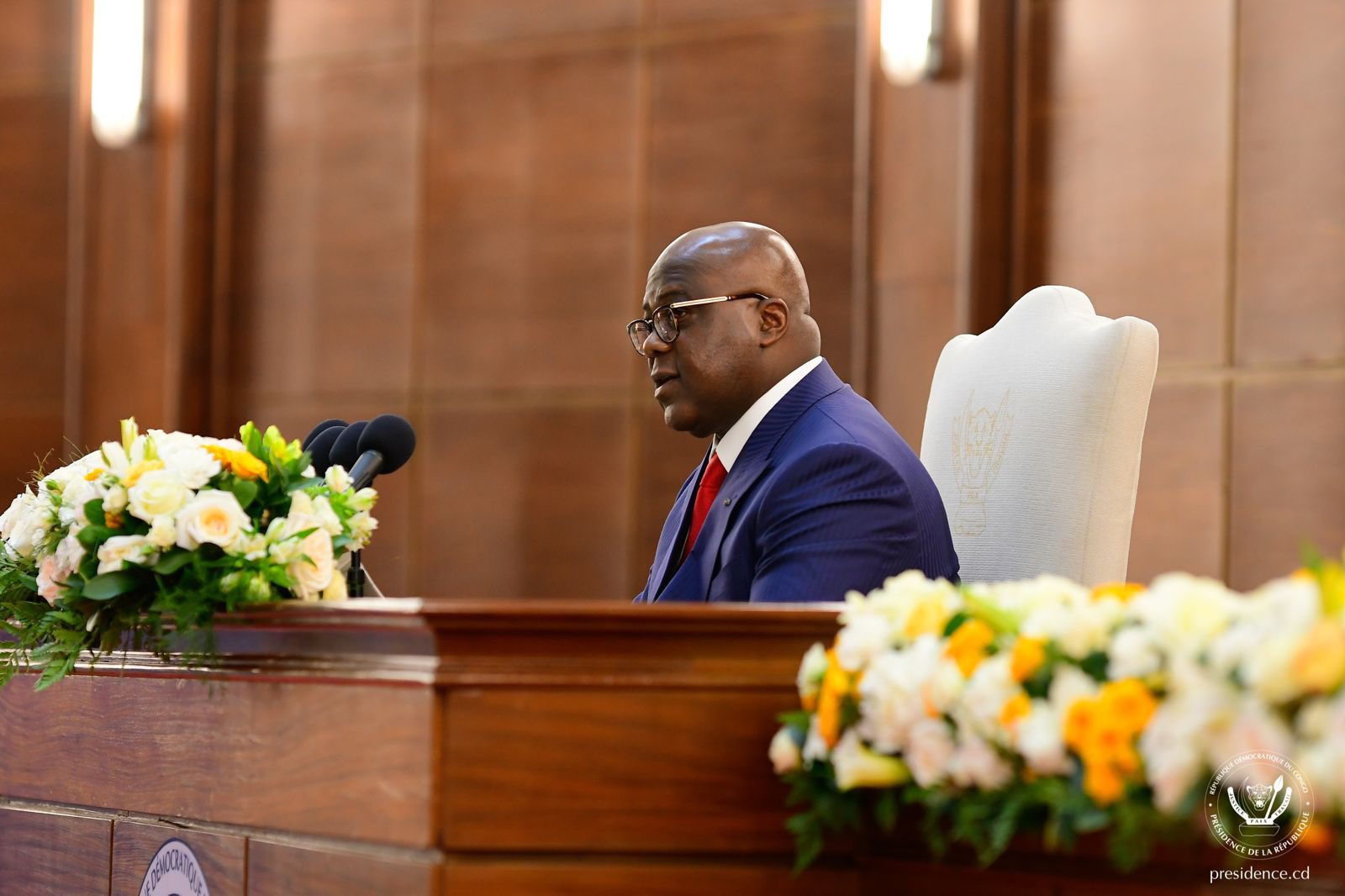
 newscd.net
newscd.net
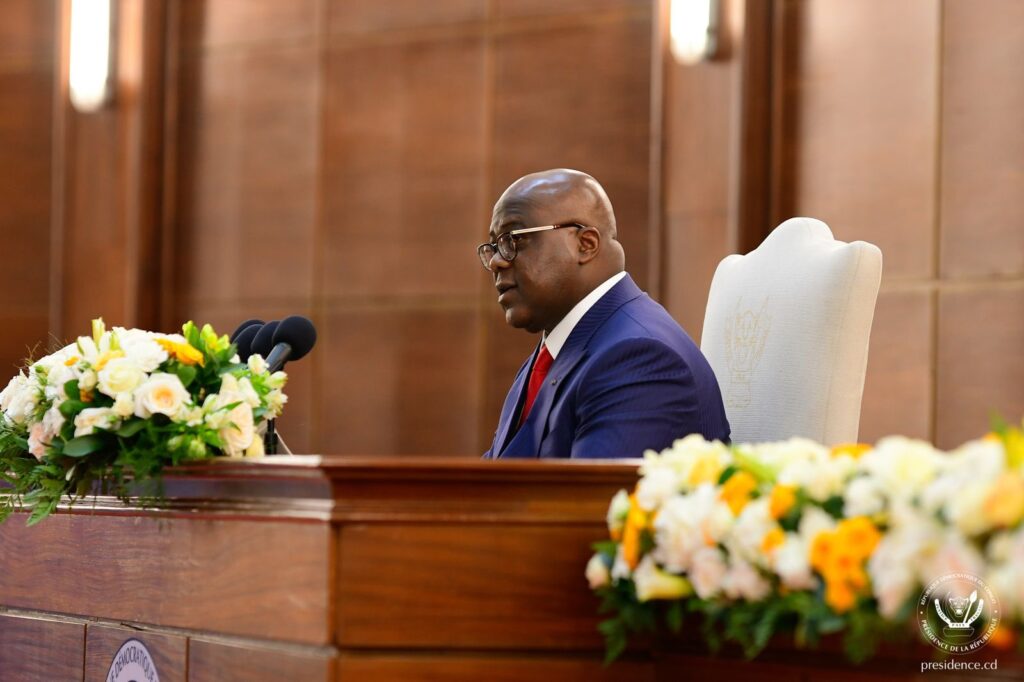
The President of the Republic, Félix-Antoine Tshisekedi Tshilombo reaffirmed on Tuesday his commitment to materialize the project to manufacture electric batteries in partnership with Zambia and the United States.
It was during the exchange of wishes with the diplomatic corps accredited in the Democratic Republic of the Congo. In his speech, Félix Tshisekedi also promised to pay particular attention to the energy transition.
"This mandate will also be that of the reaffirmation, by the next government, of our commitment to fight global warming, paying particular attention to the energy transition and the materialization of the electric battery manufacturing project continued in partnership with the Republic of Zambia and supported by the United States," said the Head of State.
During his speech, Félix Tshisekedi also returned to the 6 commitments made in his inauguration speech for his second term.
The Head of State also recalled the two candidacies expressed by the DRC, respectively as a non-permanent member of the United Nations Security Council, and that of a member of the United Nations Human Rights Council for the period 2025-2026.
JJ KITENGE
Translation
DRC: Félix Tshisekedi reaffirms his commitment to the materialization of the electric battery manufacturing project

RDC : Félix Tshisekedi réaffirme son engagement à la matérialisation du projet de fabrication des bactéries électriques - News.cd
Le Président de la République, Félix-Antoine Tshisekedi Tshilombo a réaffirmé ce mardi son engagement à matérialiser le projet de fabrication
 newscd.net
newscd.net
DRC: Félix Tshisekedi reaffirms his commitment to the materialization of the electric bacteria manufacturing project
NEWSCDJanuary 30, 2024
The President of the Republic, Félix-Antoine Tshisekedi Tshilombo reaffirmed on Tuesday his commitment to materialize the project to manufacture electric batteries in partnership with Zambia and the United States.
It was during the exchange of wishes with the diplomatic corps accredited in the Democratic Republic of the Congo. In his speech, Félix Tshisekedi also promised to pay particular attention to the energy transition.
"This mandate will also be that of the reaffirmation, by the next government, of our commitment to fight global warming, paying particular attention to the energy transition and the materialization of the electric battery manufacturing project continued in partnership with the Republic of Zambia and supported by the United States," said the Head of State.
During his speech, Félix Tshisekedi also returned to the 6 commitments made in his inauguration speech for his second term.
The Head of State also recalled the two candidacies expressed by the DRC, respectively as a non-permanent member of the United Nations Security Council, and that of a member of the United Nations Human Rights Council for the period 2025-2026.
JJ KITENGE
Attachments
Last edited:

